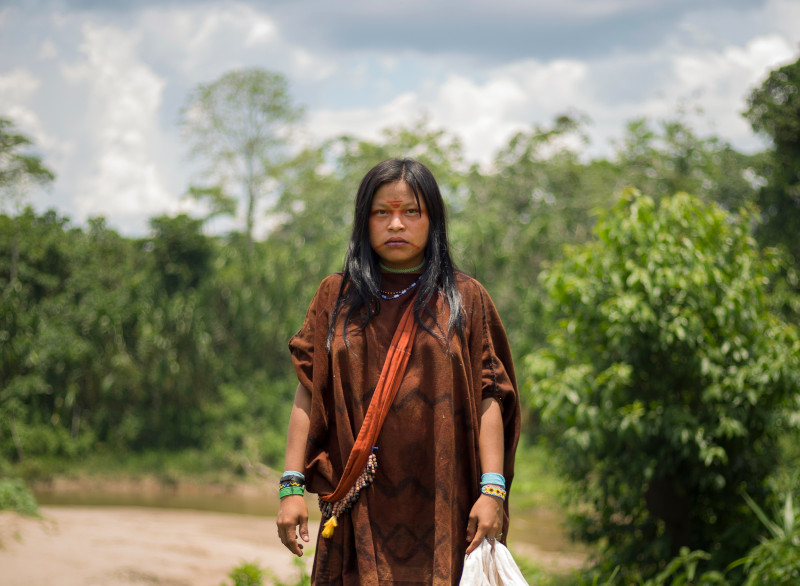Protecting those who protect human rights
June 29, 2023

Indigenous peoples are among the most targeted human rights defenders.
Human rights defenders risk their lives fighting for what should be an aspiration for all - more just and peaceful societies. Their role is recognized as essential to the UN 2030 Agenda for Sustainable Development. Yet, in most parts of the world, human rights defenders face incredible threats of intimidation or reprisal.
By raising their voices for the voiceless, defenders become the enemy of the powerful – governments, armed and criminal groups, and private corporations. Every year, thousands of them endure smear campaigns, threats and intimidation, arbitrary arrest, lengthy judicial proceedings, enforced disappearance and even murder. Official statistics on the number of human rights defenders killed each year are limited. Information on how these deaths are connected with death threats, and the other physical threats that often precede them, is even more limited. Despite this, available figures paint a grim picture. In 2021, the UN recorded 320 fatal attacks against human rights defenders, journalists and trade unionists in 35 countries. Disturbingly, in 2022, over 400 human rights defenders were murdered, the highest number ever recorded. This bleak trend does not seem to be decreasing in 2023, with four prominent human rights defenders killed in Africa in the first two months of the year. Most of the time, the culprits are not punished. With those responsible not being held to account, killings are more likely to continue.
And not only are defenders under direct attack, but their working environment has also considerably deteriorated. One weapon of choice for states is adopting restrictive legislation that slowly suffocates the work of human rights defenders by banning them from having bank accounts and receiving international donations or accusing them of various crimes, from terrorism to tax evasion, from spreading fake news to trespass. They are also targeted with acts of intimidation and reprisals for their cooperation with the United Nations.
The Special Rapporteur on Human Rights Defenders has expressed concern for the situation of defenders in all countries, including both emerging democracies and countries with long-established democratic institutions, practices and traditions. The worst attacks however, including killings of human rights defenders, often come in a context of structural violence and inequality, including in societies in conflict, and as the product of patriarchal, heteronormative systems. According to the report of the Special Rapporteur on the situation of human rights defenders, threats and killings often happen when a context of negativity has been created around defenders generally, or around particular defenders. And some defenders are even at heightened risk. The UN Human Rights Office (OHCHR) and Front Line Defenders, found that Latin America is consistently the most affected region, and Indigenous peoples and environmental rights defenders the most targeted. Women human rights defenders and defenders representing sexual minorities confront additional gender-specific risks, which make them even more vulnerable.
UNDP is supporting human rights defenders in all regions of the world, such as in West and Central Africa, where together with OHCHR and UN Women we brought together 18 women and young defenders from Burkina Faso, Cabo Verde, Cameroon, the Central African Republic, Chad, Côte d’Ivoire, Democratic Republic of the Congo, Senegal and Togo to increase their knowledge of African and international human rights protection mechanisms, improve their advocacy skills and create networks while learning from Front Line Defenders how to adopt safer routines.
In the Asia Pacific region, human rights defenders facing business-related human rights impacts and can access grievance mechanisms and get informed about redress options through a digital portal Routes to Remedy. UNDP also supports national human rights institutions that support human rights defenders and play the role of defenders themselves on the front lines of human rights challenges in countries around the world.
UNDP, through the TriPartite Partnership to Support National Human Rights Institutions, supported the Network of African National Human Rights Institutions to develop practical tools to strengthen protection for human rights defenders and promote civic space, including a Model Law on the Recognition, Protection, and Promotion of the Rights of Human Rights Defenders in Africa, which countries can utilize when drafting their legal frameworks to protect human rights defenders.
While such efforts are important, the situation of human rights defenders will not improve until states proactively expand and protect civic space and build safe environments including by removing legal and administrative barriers and practices that hinder defenders’ work and combat impunity. Without political will, the Special Rapporteur has noted, “any other action will be insufficient and possibly ineffective”.

 Locations
Locations
